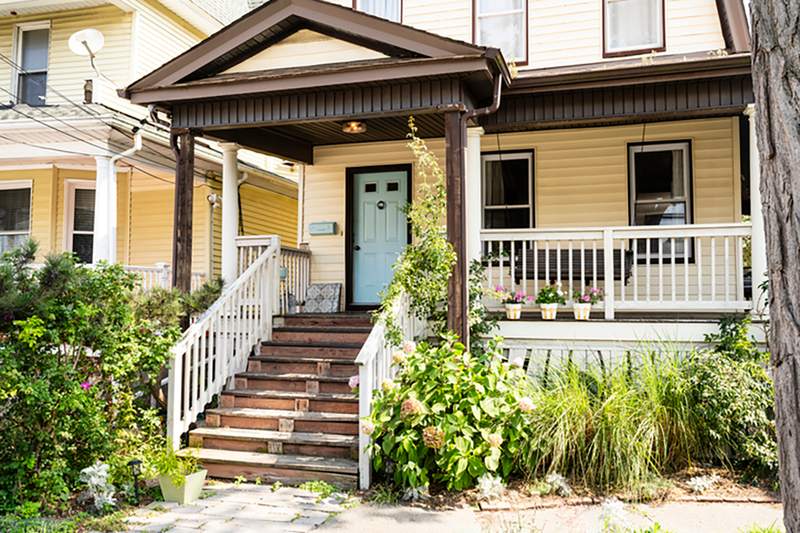When it comes to protecting your home, most people tend to think of homeowners insurance. Homeowners all across the United States understand the importance of having insurance for their houses. However, many renters might not realize they, too, can protect their living spaces.
They may be missing the benefits of having renters insurance. Some renters may believe that renters insurance is just another unnecessary expense to add to their monthly bills. However, the additional coverage you can obtain from renters liability insurance and personal property coverage can save you a lot of stress and trouble in case of theft, accidents or environmental damage.
So how does renters insurance work? Here’s a closer look.
Key Takeaways:
- Renters insurance pays for a tenant’s property in the event of damage or theft. It also protects the tenant from legal liability.
- This type of insurance covers belongings and additional living expenses after a disaster, but it doesn’t cover a roommate’s belongings or damage from earthquakes and floods.
- Before buying coverage, you should determine the value of your belongings, see if you’re eligible for discounts and compare quotes.
What Is Renters Insurance?
Wondering how to define renters insurance? Renters insurance is a type of property insurance specifically designed for people who rent their living space. Unlike homeowners insurance, which protects homeowners and their property, renters insurance (sometimes called tenant insurance) provides coverage for individuals who do not own the property they live in. It also covers you in the case of an emergency.
A renters insurance policy provides insurance for your personal belongings and liability coverage for any damage or injury you’re found legally liable for. This protects you financially in the case of unforeseen circumstances. That may include theft or damage to your personal belongings or injuries that happen to your guests. Here is some of what renters insurance may cover, depending on your policy:
- Personal property coverage: One of the main components of renters insurance is the coverage it provides for personal belongings. This includes protection against damage or loss caused by covered perils such as fire, theft or vandalism. It’s important for renters to take an inventory of their belongings to accurately estimate the value of their personal property.
- Additional living expenses: Renters insurance also covers additional living expenses in case your rented property becomes uninhabitable due to a covered event. This coverage can help with expenses like hotel bills, meals and other necessary costs while you are unable to live in your rental unit.
- Liability insurance: Another important aspect of renters insurance is liability coverage. This protects you in case someone gets injured while on your rented property and you are found responsible. It can help cover medical expenses, legal fees and damages awarded in a lawsuit.
Some property managers and landlords may require you to obtain renters insurance for the duration of your lease. However, even if it isn’t required, renters insurance is an affordable way to protect your belongings and ensure peace of mind.
What’s Your Goal?
Buy A Home
Discover mortgage options that fit your unique financial needs.

Refinance
Refinance your mortgage to have more money for what matters.
Tap Into Equity
Use your home’s equity and unlock cash to achieve your goals.
How Does Renters Insurance Work?
Renters insurance is an investment that can protect you and your property in the event of damage or loss caused by covered perils. With this type of insurance, you can have peace of mind knowing that your belongings are safeguarded. In case of a covered event, such as fire or theft, renters insurance can help you recover the value of your damaged or stolen possessions.
There are various types of renters insurance policies you can get that are available to suit your needs, including, but not limited to:
- Actual cash value coverage: This type of coverage takes into account the depreciation of your belongings. In the event of a covered loss with renters insurance, you will be reimbursed by the insurer for the current value of your items, minus your policy’s deductible.
- Replacement cost coverage: This coverage option reimburses the cost of replacing your damaged or stolen items with new ones without considering their depreciation. This means that after your deductible is paid, the insurer pays the remaining amount it would cost to purchase the same or similar items.
How does renters insurance work if you need to file a claim? Before you begin the process, remember that you don’t need to file a claim for damage to the structure of the home itself. The landlord will file the claim for structural damage, while you must file a claim for your belongings or potential liability.
Putting together a renters insurance claim is similar to filing an auto insurance claim. You’ll need to send documentation of the damage and proof of the value of any items you want to repair or replace. If your home is uninhabitable, save all receipts related to your additional living expenses.
In most cases, the easiest way to file a claim is to do so online. Once you’ve submitted the required materials, the process usually proceeds in the following fashion:
- The insurance company reviews your claim.
- It may send an adjuster for an on-site visit.
- If needed, it will request documentation of the damaged items’ value.
- It reviews all information and determines whether your claim is valid.
If your claim is approved, the insurance company will arrange payment with you. If it’s denied, you should receive a letter explaining the reason why. Insurance companies allow policyholders to appeal denials, so you may challenge the decision if you think your losses should be covered.
If you’re a new landlord, it’s worth considering whether you want to require your tenants to have renters insurance. Doing so can reduce your risk of having to cover damage to a tenant’s belongings. It also means you’re less likely to be sued for a tenant’s negligence.
By decreasing your risk of major expenditures like these, you can protect your investment, which is part of being a good landlord.
Is Renters Insurance Required?
No, renters insurance is not required; it’s completely optional. However, it’s considered to be a necessity by some. There are probably a few things that are in your rental that you would have a hard time living without. What would you do if a pipe burst and all of your furniture got destroyed? Can you afford to replace everything, or would it take a couple of months or even years to save enough money to get your place furnished how it was before?
Even though these examples are based on hypotheticals, you never know if this can happen to you in real life. If you feel comfortable that you could replace the contents of your apartment if you needed to, basic liability insurance can potentially prevent financial disaster. While you may be able to recoup the cost of your refrigerator on your own, if you end up being responsible for major damage or injury, you could face bankruptcy-level costs.
Ready To Become A Homeowner?
Get matched with a lender that can help you find the right mortgage.
What Does Renters Insurance Cover?
The extent of your coverage will depend on the policy you choose. Renters insurance is an insurance policy that can cover theft, water backup damage, property damage, damage you cause, certain natural disasters, bodily injuries and more in a rented property.
Before you purchase a policy, you may wonder what renters insurance covers. Every renters insurance policy has its own set of covered perils, or types of damage the policy typically applies to. Before purchasing a policy, you should make sure it includes all the coverage types you think you may need.
Even if your renters insurance policy covers a particular peril, it will still pay only up to your policy limit. Most renters insurance policies come with at least $100,000 in liability coverage. Coverage for your property may range from $10,000 to $100,000. When you purchase a plan, you can select how much coverage you need.
Here’s an example of why it’s important to choose the right coverage limit: Imagine you have an extensive collection of electronics worth about $35,000. A major storm damages your roof, and your entire collection is ruined by water damage.
You know that windstorm damage is a covered peril. However, when you go to file your claim, you realize that you have only $10,000 of personal property coverage. Even though your electronics collection is worth $35,000, your policy won’t pay you any more than $10,000.
If you rent an apartment, home or even a dorm, renters insurance is recommended for protecting your space and belongings in the event of a covered accident.
Theft
Let’s say someone breaks into your apartment while you are away and steals your clothes and electronics; your renters insurance would help pay for the loss of those items. Renters insurance policies can also cover personal items stolen in your vehicle or storage unit, as well as places outside of your home. It doesn’t have to be just from your rented residence. Your renters insurance could help you replace your stolen valuables even when you’re in a different city, state or country.
Property Damage
It’s possible that the place you rent could experience property damage; this could potentially destroy many of your possessions and put you out of your home while the damage is being repaired and the space is restored. However, with renters insurance, you can have peace of mind knowing that not only will it help you replace your damaged personal belongings, but it can also cover the costs of staying somewhere else, such as a hotel, if you have loss of use coverage. You may be able to receive money for any costs related to being put out of your home, like food costs from having to eat at restaurants or the costs of boarding your pets.
Protection from property damage applies, but is not limited, to any of the following events:
- Fire and smoke damage
- Severe storms, such as hurricanes, lightning storms, windstorms, ice storms, snowstorms and hailstorms
- Certain household appliances or systems
- Falling objects
- Damage caused by aircraft or vehicles
- Explosions or volcanic eruptions
- Vandalism
Visitors’ Injuries
Even though it seems unlikely that a guest will get hurt on your property, liability insurance can cover the costs of medical and legal bills if that happens. In the rare case that one of your guests needs extensive medical care that you’re found responsible for, these costs could easily bankrupt you if you don’t have insurance to cover these costs.
Emergency Living Expenses
Many renters insurance policies cover additional living expenses (ALEs) after a disaster. ALE coverage can be helpful if you’re forced out of your house or apartment due to a hurricane, wildfire or other covered loss. It often covers expenses like:
- Temporary hotel stays
- Meals
- Pet boarding
- Storage fees for some belongings
- Laundry fees
Most policies cover only ALEs that go beyond your usual budget. They also typically put a cap on the total amount they’ll pay.
Vehicle Break-Ins
Your renters insurance policy will likely cover personal belongings left in your vehicle. For example, let’s say you leave your laptop in your car overnight and someone breaks a window and steals it. Your renters insurance wouldn’t cover the broken window, but it would cover the cost of the laptop.
Identity Theft And Credit Card Fraud
Most renters insurance policies don’t offer coverage for identity theft and credit card fraud by default. However, many companies offer it as add-on coverage. Insurance coverage for identity theft and credit card fraud will cover expenses associated with these crimes (up to your policy limit).
Funeral Expenses
Some policies will reimburse you for funeral costs if someone dies in an accident on your property.
Take The First Step To Buying A Home
Find a lender that will work with your unique financial situation.
What Does Renters Insurance Not Cover?
What is not covered by renters insurance? While renters insurance offers broad coverage, there are many incidents that are not covered by renters insurance. These may include:
Floods And Earthquakes
While most renters insurance policies cover many natural disasters, floods and earthquakes aren’t typically included in rent coverage. The same is true for homeowners insurance.
Therefore, it’s recommended that if you live in an area that is known for having earthquakes (like California) or floods (like Louisiana), you’ll want to purchase a policy that specifically covers what you need.
Auto Theft
Renters insurance also covers the personal belongings in your car, but not the vehicle itself. If the car is stolen, then auto insurance will be responsible for that. If you need to purchase auto insurance as well, it may be worth looking into insurance bundling to save on your premiums.
Roommates’ Belongings
Your renters insurance doesn’t help cover the loss, theft or damage of a roommate’s belongings. The only other parties your renters insurance policy can protect are your spouse and your children who live with you. Even your young adult child is protected under your policy while they’re away at college. However, if your non-immediate-family roommate wants personal property and liability renters insurance, they must get their own policy.
Bed Bugs, Termites And Other Pests
Renters insurance generally won’t cover costs related to infestations of termites, bedbugs or other pests. However, that doesn’t necessarily mean you’ll be on the hook. In most cases, the landlord is responsible for remedying these issues.
Your Roommates
Does renters insurance cover roommates? Not as a rule. Your insurance will generally cover only you, unless other people (and their belongings) are explicitly named on the policy.
Your Medical Bills
If another person gets hurt at your home, your renters insurance can pay for their medical bills. However, if you get hurt, you’ll need to use your health insurance policy instead.
Unusually Expensive Or Valuable Items
If you possess any high-value items, you might need to purchase separate coverage. Most policies set “sub-limits” for certain classes of items.
For example, suppose that your renters insurance has a $30,000 personal property limit and a jewelry sub-limit of $2,000. If someone breaks into your home and takes $3,000 worth of jewelry, your policy would pay only $2,000.
How Much Does A Renters Insurance Policy Cost?
The average renters insurance premium costs around $125 – $150 annually, which is about $10 – $12 per month. However, the cost of your renters insurance policy will depend on these factors:
- Location
- Coverage limits
- Deductible
- Whether you have actual cash value or replacement cost coverage
Opting for a higher deductible means less risk for the insurance company, which often translates to a lower premium for you.
How Can I Save Money On Renters Insurance?
To save money on renters insurance, you can take several additional security measures in your rental. Installing a security system, such as an alarm or surveillance cameras, can lower your insurance premium, as it reduces the risk of theft or vandalism.
Also, building a strong credit score is another effective way to save on renters insurance. Insurance companies will often consider credit score when determining premiums, so maintaining good credit can lead to lower rates.
Insurance bundling, which involves obtaining renters and auto insurance policies with the same company, can result in significant savings. Lastly, shopping around and comparing quotes from different insurers can help you find the best deal that fits your needs and budget.
How To Get Renters Insurance
Once you know the answer to “What does renters Insurance cover?” and have decided that getting renters insurance is the best option for you, knowing the steps to take when starting the process can be helpful.
1. Determine What You Need Covered
The first step is to assess your belongings and their value. Take an inventory of your possessions, including furniture, electronics, appliances and other valuable items. When listing them, record how much you paid for them or their estimated value. If you have receipts or other documents that prove their value, attach copies to your inventory.
Additionally, consider any specific risks you might face, such as living in an area prone to natural disasters or having expensive jewelry. Assessing your needs will ensure that you have adequate coverage for potential losses or damages.
2. Choose Your Coverage Type
Decide how much renters insurance coverage you need. The amount will depend on what you need coverage for; this is based on the number of personal belongings you have and how much you can afford on top of your monthly rent and additional living expenses.
You must factor these into other extended policy options if you have any high-value possessions. Going through your rental space and making a list of your belongings will not only help you get the right amount of coverage, but can also be helpful to have on hand if you need to file a claim.
You’ll also need to choose between actual cash value (ACV) and replacement cost coverage. A policy that provides ACV protection will take depreciation into account when paying out a claim. A policy with replacement cost coverage will pay you the cost of a replacement item at today’s retail prices.
For instance, let’s say you bought a couch four years ago for $500. It has a torn cushion and a cracked leg, so it’s now worth about $300. Today, the same model couch retails for $700.
If the couch were destroyed and you had ACV coverage, you would receive only $300. However, if you had replacement cost coverage, your policy would pay you $700. Policies with replacement cost coverage are more expensive, but they tend to make it easier to replace damaged items.
3. Compare Renters Insurance Company Quotes
The last step is considering several renters insurance companies and comparing quotes to get the best option and price. You don’t have to settle for the first offer. It is highly recommended to shop around to see what coverage options each policy offers, find the best rate and read customer reviews.
To help you prepare for getting renters insurance, there are several requirements that companies typically have, which include, but are not limited to:
- Personal information
- Type of coverage desired
- Credit and credit history check
4. Choose Your Deductible
The deductible you choose can have a major impact on your premium. Once you’ve gotten a quote from a particular insurer, you can often adjust your deductible to see what your premium would be.
Higher deductibles result in lower premiums. Keep in mind, however, that this means you’ll pay more out of pocket if you file a claim.
5. Pay For Your Policy
Once you’ve selected a suitable policy, all that’s left to do is purchase it. You can typically set up a monthly payment plan, but you’ll likely save money if you pay for the whole term (usually 12 months) at once.
FAQ: How Renters Insurance Works
Here are some frequently asked questions on what is and is not covered by renters insurance and how the claims process works:
If your belongings are at risk of further damage, you should take steps to protect them. For example, if some of your belongings have been damaged by a roof leak, you should move other nearby items out of harm’s way and find a container to catch the water.
Homeowners insurance includes the above as well as the structure of the home, which you own. Homeowners insurance covers the actual building you live in (and associated structures such as garages).
With renters insurance, the landlord will be expected to have coverage on the building, while your insurance will cover your personal property. When taking out a mortgage, most lenders will require you to have homeowners insurance.
Do landlords require renters insurance? Tenants aren’t always required to have renters insurance. However, it’s recommended to protect personal property and liability, which is not the responsibility of the landlord.
For example, imagine that your policy comes with $20,000 of personal property coverage. That means it would pay only up to $2,000 for items damaged in or stolen from a storage unit.
The Bottom Line: Renters Insurance Can Financially Protect You In An Emergency
When considering whether to get renters insurance, it’s essential to carefully consider your ability to cover unexpected expenses that may arise. If you’re hesitant to get renters insurance because you think the odds of anything bad happening are low, it’s worth taking a second look.
Understandably, people don’t like spending money on a service they may never need. However, insurance is meant to protect you from financial ruin in case of unexpected events. Having renters insurance can provide peace of mind that, if something bad were to happen, you won’t lose everything.
If you are ready to make the jump from tenant to homeowner, to begin the mortgage approval process.

Ben Shapiro
Ben Shapiro is an award-winning financial analyst with nearly a decade of experience working in corporate finance in big banks, small-to-medium-size businesses, and mortgage finance. His expertise includes strategic application of macroeconomic analysis, financial data analysis, financial forecasting and strategic scenario planning. For the past four years, he has focused on the mortgage industry, applying economics to forecasting and strategic decision-making at Quicken Loans. Ben earned a bachelor’s degree in business with a minor in economics from California State University, Northridge, graduating cum laude and with honors. He also served as an officer in an allied military for five years, responsible for the welfare of 300 soldiers and eight direct reports before age 25.












